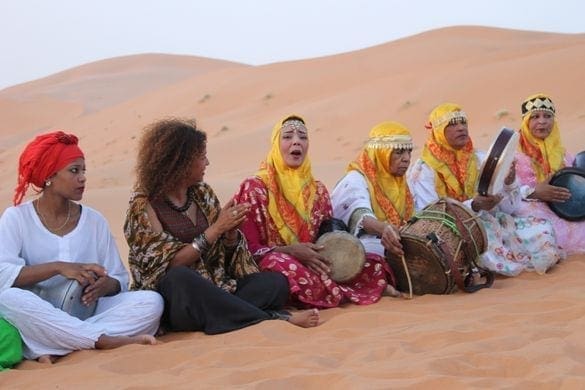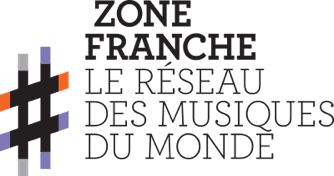North African and Oriental artists - the rise of female musicians
As International Women’s Day approaches, the Arabofolies Festival - taking place at the Paris Arab World Institute (AWI) - focuses its attention upon musical trailblazers and poetic pioneers. A rich production catalogue also testifies to their artistic and social commitment. But where is gender equality at in the music sector? Kamilya Jubran, Souad Asla, Naïssam Jalal and others share their thoughts.
Music, sound and poetry – whether sung, played, danced or shouted by women – is springing up all over the world. For the first edition of the Arabofolies Festival organised by the AWI, North African and Oriental female artists offer a rich range of creativity. We’ve just heard flautist Naïssam Jalal revisit the album she recorded with Palestinian rapper Osloob (Al Akhareen). On 8 March, Souad Massi will perform songs from her album in tribute to women, the release of which is slated for August. In the mid-2000s, singer Aynur Dogan’s profile was raised by Fatih Akin’s documentary Crossing the Bridge - The Sound of Istanbul. On 9 March, the unpretentious diva – whose name means “moonlight” – will sing of the suffering and hopes of the Kurdish people.
Video Aynur Doğan, Qumrike
Creative women from all geographical and stylistic horizons
Beyond Arabofolies, a great many albums and quality stage performances testify to the creativity of women. The gentle and fearless Kamilya Jubran, Palestinian singer and oud player, brightened up 2017 with her incandescent album Habka (distributed by Abalone / L’Autre Distribution), recorded with bassist and arranger Sarah Murcia. Then there are also the girls who skilfully master turntables and machines, such as Tunisian DJ Missy Ness. During the 2018 edition of the Africolor Festival (in Seine-Saint-Denis, near Paris), Lemma – a group of ten Algerian desert singers and drummers (aged 23 to 74!) – founded by singer, author and composer Souad Asla, dazzled Le Théâtre d’Evry, while legendary singer Hasna El Becharia – also a member of Lemma – turned the (jam-packed!) Maison Populaire in Montreuil-sous-Bois into a dance floor.
Video DJ Missy Ness, Makouk Vol. 1, All Stars Night, Cairo, Egypt
In February, following the success of her record Aswât (distributed by Alwâne Music / Differ-Ant), the singer Djazia Satour captivated audiences at Le Café de la danse (Paris) and Caf’Muz (Colombes) with the soothing effects of her subtly mixed Chaâbi. The greatly-anticipated muse of the Sahrawi people Aziza Brahim (singer and percussionist) will be performing on 26 April at the Pan Piper venue in Paris for the launch of her fifth album. Born and raised in a refugee camp, she will be singing about resistance. The list is long; female virtuosity becomes flesh and sound thanks to creativity from all geographical and stylistic horizons.
However, like female artists in general – whatever their country of origin – singers and musicians from North Africa and the East do not enjoy the same professional opportunities as their male peers. They have fewer scheduled concerts, less presence in the media, less access to subsidies, less recognition, prizes and other distinctions, etc. It’s not about pointing out individual responsibilities. The problem is above all societal and social. But if we all – women and men alike – paid attention to this problem, progress could be made.
Video Djazia Satour, live 2019 teaser
Women account for only 18% of music industry leaders
In France, studies show that only 5% of professional jazz instrumentalists, for example, are female. Also, in jazz, according to a 2016 ADAMI document, barely 10% of women are involved in artistic productions; the world music sector is doing better; there the figure rises to 16%. The percentage of women leaders in world music (artistic directors, main artists, soloists…) amounts to 18%.
Discrimination can frequently be found in the detail and is mostly practised unconsciously. In 2016, Almot Wala Almazala, Naïssam Jalal’s second album, was the fourth biggest seller among jazz records at the Fnac (a specialist French retail chain) two months after its release. This significant recognition showed that the French flautist, composer and band leader of Syrian origin had grabbed the attention of a niche and well-informed audience. It was also surprising to see a specialist magazine introduce Naïssam Jalal as a “newcomer” after the release of her next album… She who was nominated for the Victoires du Jazz in 2018 explains: “It’s very difficult to truly and objectively assess what difficulties I have faced as a woman, since gender discrimination is rarely seen explicitly. Usually, those who practise discrimination don’t even realise it. They just don’t take us seriously. Generally speaking, I think the music industry is very male-dominated. As a woman, gaining legitimacy demands a lot of hard work”. The female artists we interviewed about being the daughters of immigrants – or perceived as such – share Naïssam Jalal’s observation: “The prejudice I face all too often is motivated by two things: that I’m a woman and the daughter of an immigrant”.
Video Souad Asla-Lemma, Lemti
Building credibility in a predominantly male environment
Women in other fields – agents, tour organisers, managers, for example – face similar obstacles. Leila Chaïbeddra is the artistic director of Tartine Production, which works with singers such as Djazia Satour, Elida Almeida and Maya Kamaty. She says: “The question I get asked most often is: ‘When will I get to meet the boss of Tartine Production?’ When I tell them I am the boss, there’s always a moment of hesitation, as if the other person is having trouble believing it because it seems unlikely. My main challenge has been to build my credibility in an environment where most venue and festival directors are men, who are used to dealing with male tour managers in the main.” Souad Asla confirms: “I had to assert myself as a legitimate songwriter and do so in a very male-dominated environment convinced it has a near monopoly on knowledge and expertise. Fortunately, the situation has improved, but there’s still a long way to go”. When we ask Souad Asla about the biggest challenge she has had to face, she is quick to answer: “Running the Lemma project. I brought together as many as 12 women from my village, deep in the deserts of southern Algeria, 1,200 km from the capital. I had to convince them – and especially their families (husbands, sons, fathers…) – to leave their homes, give up their anonymity and perform in front of an audience. Our mission is to safeguard these ancestral songs. It’s essential we find ways to get them out there. We’ve had to lead a cultural, social and economic struggle against obscurantism”.
Some women have fled their countries because of war and other tragedies. Ourida Yaker, head of Tour’n‘sol Prod, left Algeria at the end of the 1990s, the Black Decade. She settled in France, not for fear of terrorism but to “be free to work and not give in to the system”. Highly concerned about the conditions experienced by female artists in France, she has set up an organisation to help bring to the fore musical talents that were neglected at the time. Sidi Bémol, Naïssam Jalal, Souad Asla, Fanfaraï Big Band, among others, now benefit from Ourida Yaker‘s commitment. She tells us, “I have always thought of my organisation as a tool for the artists I help. They are like family to me. I am not alone; we stick together. But the road has been long, difficult and still is”. Thanks to the efforts of Tour‘n’sol Prod – and of course a catalogue of talented artists – Fanfaraï Big Band and Lemma will perform at the Opéra de Lyon on 15 June. Respect to this prestigious cultural institution for opening its doors to these two fantastic bands and allowing new audiences to discover them!
Video Hasna el Becharia, Hakmet Lakdar.
Arabofolies, a trailblazer in its approach to women
Since coming to France in 2002, Kamilya Jubran has had time to assess the situation. “I noticed that the place given to women, regardless of nationality and origin, is limited. Besides, women are often reduced to the role of singer. I had absolutely no idea about that when I was living in Palestine, where new generations of female musicians have managed to break into the current scene. We can see this happening in Lebanon and Egypt as well, even if equality does not exist there yet. Young women are clearly laying claim to their place”. Kamilya Jubran’s experiments are extremely demanding. At Banlieues Bleues, a famous festival in the Paris area held in late March, she will lead a project with Sodassi, a group of six voices from the bubbling underground scenes in Ramallah, Beirut and Cairo. Sophisticated as well as daring, the project will combine rock, jazz, electro and slam in a breath-taking “pan-Arab” avant-gardism.
Video Kamilya Jubran & Werner Hasler, Al Shaatte Al Akhar / كميليا جبران وفرنر هاسلر – الشاطئ الآخر
Put together by Marie Descourtieux, cultural activities manager at the AWI, the exemplary Arabofolies programme includes a high proportion of women. Which goes to say that where there is a will to present female artists, there’s a way… On 7 March, as part of AWI Thursdays, Arabofolies will invite contributions to a debate entitled Maghreb: A Legacy Put To the Test of Equality [Maghreb : l’héritage à l’épreuve de l’égalité] – a free event subject to availability, like all free events at the AWI. “Then, on 8 March, we’re planning a forum, a new space for free expression aimed largely at civil society in the Arab world,” says Marie Descourtieux. “This time, we’ll provide a platform for women’s struggles on this theme, something common to both sides of the Mediterranean”.
“Yes to the Zone Franche initiative in favour of a world music quota”
The artists we’ve met do not close themselves off as victims. They act unflinchingly with as much passion and patience as tenacity. Before them, pioneers such as Algerians Malika Domrane, Zahouania, Warda and the legendary Cheikha Rimitti, the Lebanese Magida El Roumi and her predecessor the venerable Fairuz, not to mention the famous Egyptian Oum Kalsoum… have paved the way. These female warriors have never succumbed to the well-known French saying “Sois belle et tais-toi” [Be beautiful and keep quite]. On the contrary, they have tirelessly used their art for the sake of artistic research and social, educational and shared causes…
Video Naïssam Jalal et Osloob, Al Akhareen album, Fight Back (live)
Naïssam Jalal has the final word this time: “I have long resisted quotas and positive discrimination. Still, maybe this is one of the solutions. When we are ignored, mechanisms, even legislative, must be required so that our work and contribution to society is taken into account. From this point of view, the Zone Franche initiative aimed at implementing ‘world music’ quotas is positive, legitimate and inescapable”. Female artists do indeed deserve much more recognition, more festival programmes and other events to match their talent. Echoing a poem by Mahmoud Darwish, we honour the doves who fly to save the roses, but also the rose bushes.
Video Fayrouz, Nassam Alayna El Hawwa
USEFUL INFORMATION:
At the Arab World Institute: Exhibition devoted to Arab divas from 20 March, 2020.
Naïssam Jalal, http://naissamjalal.com
Kamilya Jubran, CD with Sarah Murcia, Habka (Abalone / L’autre Distribution), www.kamilyajubran.com/:
Souad Asla, CD Jawal (self-produced) & CD Lemma (Buda Records / Universal), www.facebook.com/souad-asla-115813658457045/:
Djazia Satour, CD Aswât (Alwâne Music / Differ-Ant), https://djaziasatour.com/
CDs and DVDs (released by MLP):
Oum Kalsoum, CD Al Atlal;
Fairouz, DVD Fairouz à Las Vegas;
Oum Kalsoum, DVD Ya Massaharni;
Warda, DVD Live at Palais des Congrès de Paris.
Algeria, women’s voices:
https://itunes.apple.com/fr/album/alg%C3%A9rie-voix-de-femmes/961191591
https://itunes.apple.com/fr/album/alg%C3%A9rie-voix-de-femmes/949101153


